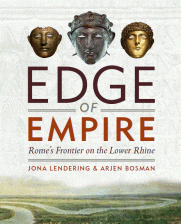“The Biblical plagues that devastated Ancient Egypt in the Old Testament were the result of global warming and a volcanic eruption.” This time, it’s a professor Augusto Magini, paleoclimatologist at Heidelberg University, who helps give science a bad name.
He argues that there was a dramatic climate change in the second half of the reign of Ramses II: after a favorable climatic period with plenty of rain, a dry period started. That is very interesting as it helps us understand the collapse of the Bronze Age world system. I would love to know more about it. For instance, is there corroboration from other areas?
Magini is apparently not content with one interesting result. He continues to argue that the climate change triggered the Biblical plagues. Now things become embarrassing. He and a colleague named Stephan Pflugmacher, biologist at the Leibniz Institute in Berlin, argue that rising temperatures would have caused the Nile to dry up, which would in turn have caused the arrival of the first plague: the river turning to blood – or toxic algae, as the scientists prefer to read the text. From here, they jump to frogs, lice and flies. Finally, the exploding volcano Thera would explain the darkness. And so on, and so on.
News reports like this are published every year, usually in the weeks before a major religious festival. This time, it was Passover; the “scientific” reading of the Quran usually makes the headlines during the Ramadan, while scientific explanations of the Star of Betlehem belong to Christmas like sending cards and eating turkey. I am not claiming that all scientists are necessarily wrong, but Magini obviously is.
In the first place, if he wants to take the Bible litterally, why does he accept the description of the events (the sequence of plagues, for example), but doesn’t he accept the chronology? You cannot only use the part that suits you and ignore the part that doesn’t. The Bible is pretty explicit about chronology (1 Kings 6.1), and there is simply no way to put the Ten Plagues during the reign of Ramses. Of course I am aware that many scholars have argued away the chronology of the Exodus, but these scholars also accept the story of the Exodus as a literary text, not as a historical event. If you’re a litteralist and want to believe that the Ten Plagues are a fact – fine, but then you must offer arguments why you don’t accept the text in its entirety.
In the second place, the Bible does not refer to rising temperatures or a dry climate. Of course Magini can answer that the Bible does not mention a lot of things -the name of the pharaoh for example – but he will admit that “you can add to a text any element you need” is not sound logic. By adding an element that’s just not there, Magini’s second mistake is the converse of his first one: leaving out what did not suit him.
I could go on ’till the cows come home. The authors of the Bible were not stupid. They were perfectly capable of distinguishing between algae and blood, for example. And whenever the Thera exploded, it was not during the reign of Ramses. And so on. But my main point is this: history is a profession. You need some training. Reading an ancient text is less easy than is often assumed – even by historians themselves, as I often need to point out on this little blog.
Scientists can do a lot of things, like establishing that there was a climate change in the third quarter of the thirteenth century. That’s good and I am grateful for that. But reading ancient texts is something else. I am not saying scientists should not discuss history, because I know that the two fields sometimes overlap. But when I have to discuss, say, ancient astronomy (here), I check things with a professional scientist. It would have been better if Magini, who works at a university with an excellent history department, had walked to his colleagues and asked what they thought about his idea.
Until now, I have received eighteen e-mail messages about Magini’s article. If he had been a bit more careful, a bit more scientific, he might have saved me a lot of time.

 Subscribe to feed
Subscribe to feed